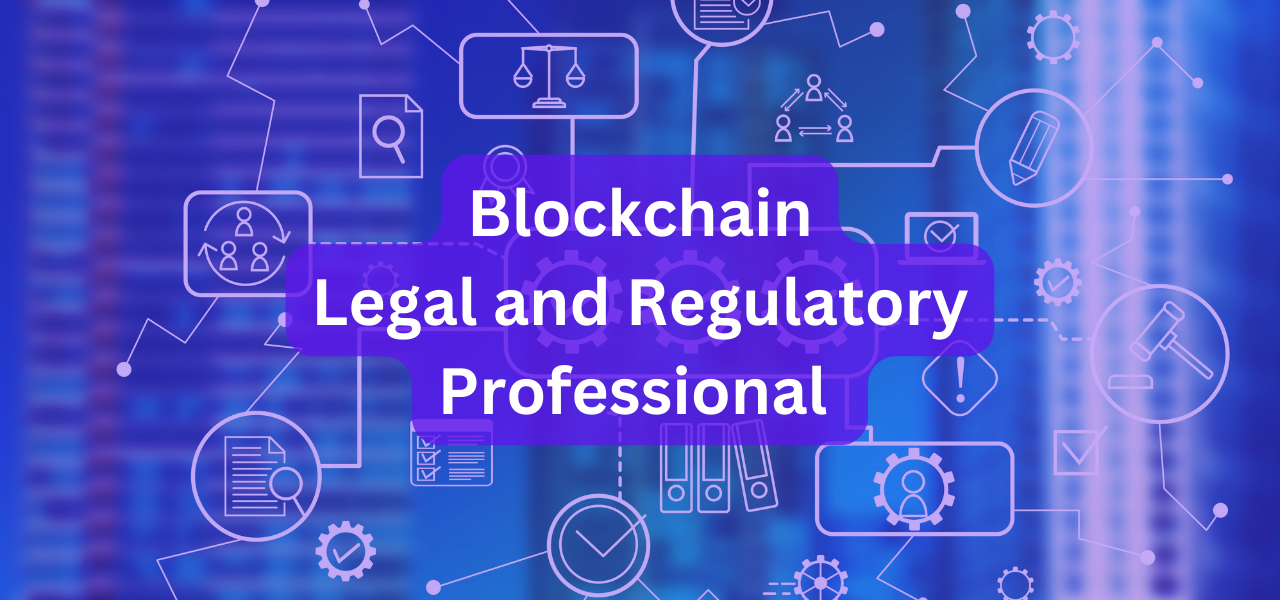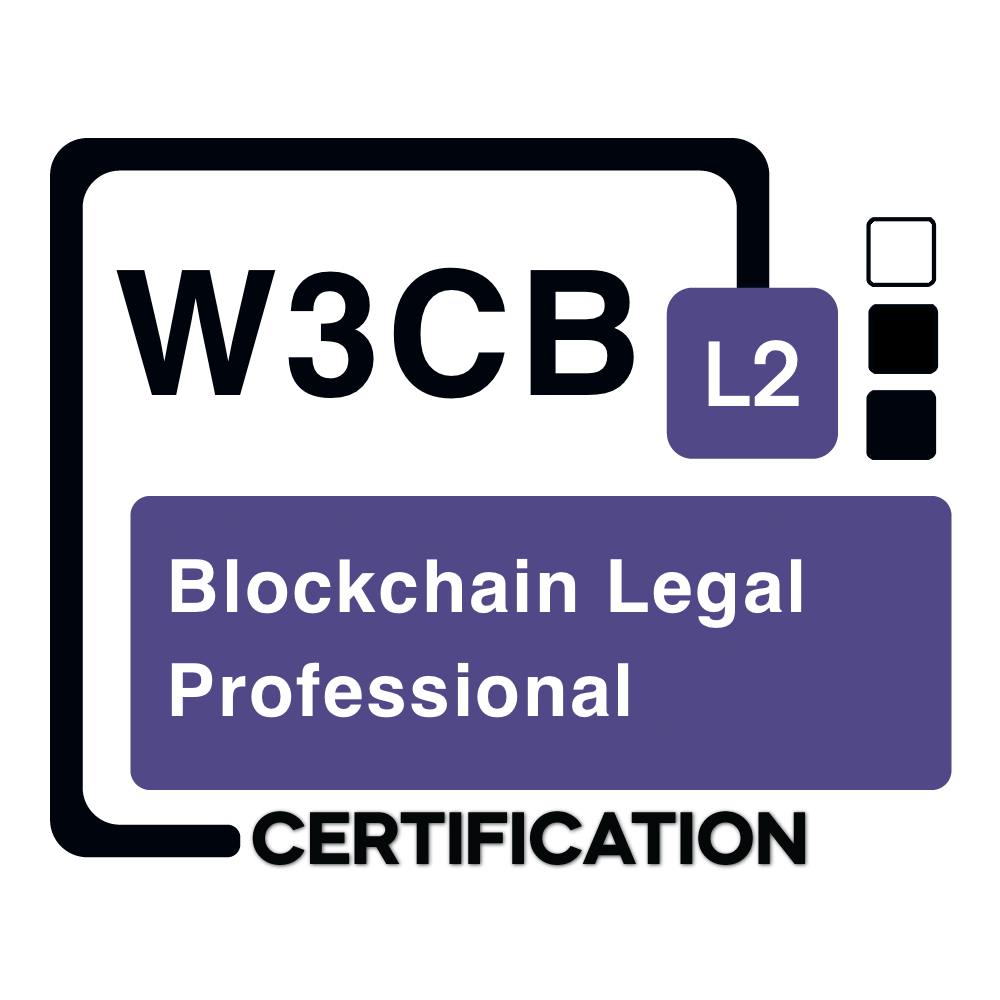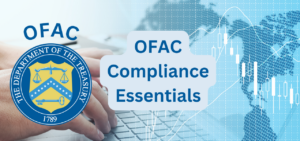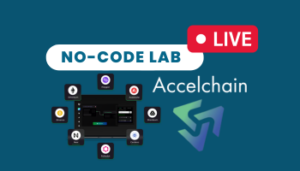Certified Blockchain Legal and Regulatory Professional


Certified Blockchain Legal and Regulatory Professional
Blockchain is the Most In-Demand Hard Skill in 2020. – LinkedIn
The Certified Blockchain Legal & Regulatory Professional program provides law students and existing legal professionals the tools necessary to be part of a digital future by teaching the basics of blockchain, smart contract technology, and the current regulatory environment US as well as globally. Hands-on examples and live coding sessions will demystify the phenomenon of “blockchain” and introduce simple but effective strategies to use smart contracts today. This course will also focus on the combination of both legal and smart agreements in one cohesive process.
The techniques taught will allow legal professionals to combine their unique domain knowledge with real-world smart contract agreements, offering their clients the best of both worlds.
Continuing Law Education (CLE-Group A):
- 2.5 CLE Credits – Law Practice Management
- 19 CLE Credits – Areas of Professional Practice
Courses in this Certificate Program
- 59 Total Hours
- OnDemand: 40 Hours
- LIVE Online: 19 Hours+
- Tuition: $1,795
| Courses in this Program | Hours | Delivery Method |
|---|---|---|
| Student Orientation | 1 Hour | LIVE Online (optional) |
| LIVE Instructor AMA - bi-monthly | 1 Hour + | LIVE Online (optional) |
| Web3 Foundations | 3 Hours | OnDemand - Instructor Supported |
| Blockchain Foundations | 6 Hours | OnDemand - Instructor Supported |
| Data Protection Regulation: GDPR, CPRA/CCPA | 4 Hours | OnDemand - Instructor Supported |
| AI Essentials | 3 Hours | OnDemand - Instructor Supported |
| EXAM VOUCHER - WEB3+ CERTIFICATION | 1 Hour | AI/Human Remote Proctored Exam |
| Blockchain for Lawyers | 15 Hours | OnDemand - Instructor Supported |
| Key Management | 3 Hours | OnDemand - Instructor Supported |
| Information Security and Cyber Risk Awareness | 4 Hours | LIVE Online |
| Blockchain Enterprise Strategy LIVE Workshop | 3 Hours | LIVE Online |
| AML/KYC Essentials | 3 Hours | LIVE Online |
| Bank Secrecy Act and Anti-money Laundering | 4 Hours | LIVE Online |
| OFAC Compliance Essentials | 5 Hours | LIVE Online |
| Blockchain Regulatory Environment | 10 Hours | OnDemand - Instructor Supported |
| EXAM VOUCHER - BLOCKCHAIN LEGAL PROFESSIONAL CERTIFICATION | 2 Hours | AI/Human Remote Proctored Exam |
Upcoming LIVE Instruction Dates
OFAC Compliance Essentials May 2 2024

OFAC Compliance Essentials May 2 2024 Live Instructor-Led Course Thursday, May 2, 2024 4 Hours 11:00...
May 2 @ 11:00 am - 2:00 pmBank Secrecy Act and Anti-money Laundering May 7 2024

Bank Secrecy Act and Anti-money Laundering May 7 2024 Tuesday, May 7, 2024 11:00 AM to 2:00 PM Easte...
May 7 @ 11:00 am - 2:00 pmInstructor AMA Friday May 10 2024

Friday | 1 Hour | 2:00-3:00 PM EST (11:00 AM PT, 6:00 PM GMT) Attend LIVE to learn directly from...
May 10 @ 2:00 pm - 3:00 pmNo Code Lab Thursday May 16 2024

Thurs | 2.5 Hours | 11:00-1:30 PM EST (8:00 AM PT, 3:00 PM GMT) Attend LIVE to build without cod...
May 16 @ 11:00 am - 1:30 pmInstructor AMA Friday May 25 2024

Friday | 1 Hour | 2:00-3:00 PM EST (11:00 AM PT, 6:00 PM GMT) Attend LIVE to learn directly from...
May 24 @ 2:00 pm - 3:00 pm
Blockchain Legal and Regulatory Program Objectives
Upon successful completion of this intensive program, participants will be able to:
Continuing Law Education (CLE)
- 2.5 CLE Credits – Law Practice Management
- 19 CLE Credits – Areas of Professional Practice
Understanding the basics of blockchain, smart contract technology, and the need for regulation.
Combine both legal and smart agreements in one cohesive process
Contract forma based on standardized templates
Software-guided execution of machine-accessible contract clauses
Understand data-driven compliance solutions
Identify the challenges of regulating a Decentralized Autonomous Organization (DAO)
Breakdown existing US, European and International Laws and Regulations
Comprehend anticipated regulation as blockchain technology changes how we live and work
Certificates of Completion
Prepared to sit for two (2) Certifications from the Web3 Certification Board (W3CB)
Review Topic Areas and Exam Competencies on W3CB.org. W3CB Exam Fees are included. Practice Exams are not included.
Prerequisites
No prior blockchain or computer programming experience is required.
Target Audience
This program is tailored for professionals in legal, compliance, or regulatory roles who wish to gain specialized expertise in blockchain technology. Ideal for lawyers, compliance officers, regulators, or any professional keen on understanding the intersection of law and blockchain.
Questions Explored
What is the foundation and potential of Web3 and Blockchain technology?
How does Blockchain technology intersect with legal principles?
What are the key aspects of data protection regulation like GDPR, CPRA/CCPA?
How can you create an effective Blockchain Enterprise Strategy?
What is Key Management and why is it essential?
What are the AML/KYC essentials for Blockchain?
How does the Bank Secrecy Act and Anti-money Laundering regulations apply to Blockchain?
Why is Information Security and Cyber Risk Awareness essential in the Blockchain space?
What is OFAC Compliance and how does it affect Blockchain transactions?
How does data privacy regulation impact Blockchain implementation and strategy?
Blockchain Legal Professional Course Details
Web3 Foundations Course
Module 1: Understanding what Web3 is
- Overview of Web3 features and architecture
- The history of Web1 and Web2
- Characteristics of Web3
- Decentralization
- Terminology
Module 2: Why Web3
- Data is the New Oil
- Why Web3 Matters
- The Purpose of Web3
- The flow of Talent to Web3
- The transfer of Value from Web2 to Web3
Module 3: Web3 and the Metaverse
- What is the Metaverse
- Technologies of the Metaverse
Module 4: Blockchain Fundamentals
- Blockchain is Not Bitcoin
- Blockchain Definitions
- History of Blockchain
- Properties of Blockchain
- 10 Key Concepts of Blockchain
- How does Blockchain Work?
- Consensus Types
- Mining and Verification
- Smart Contracts
Module 5: Understanding DeFi
- What is DeFi
- DeFi vs Traditional Finance
- DeFi Activities
- DeFi Risks
Module 6: Challenges, Risks and Ethics of Web3
- Advantages of Web3
- Challenges of Web3
- Speed of Web3
Module 7: What comes after Web3?
- What is Web3
- Is there a Web4 and what is it
- Is there a Web5
Blockchain Foundations Course
Module 1: Blockchain Background and Basics
- Blockchain History
- How Blockchain Works
- What are the Properties of a Blockchain?
Module 2: Different Types of Blockchains
- Private vs. Public Blockchains
- Permissioned vs. Permissionless
- Public vs. Private vs Hybrid Discussion
Module 3: Consensus
- Consensus Mechanisms
- Consensus Protocols – 14 examples
Module 4: Cryptography and Hashing
- Machine/Mathematical Cryptography
- Hash Function Properties
Module 5: Smart Contracts
- Intensive Smart Contracts
- Advantages and Disadvantages of Smart Contracts
- Blockchain Oracles
Module 6: Blockchain Wallets
Module 7: Pros and Cons
Module 8: Public Blockchain-Based Applications
Module 9: Blockchain and Crypto Regulation
- Regulatory Opportunity and Challenges
- Global Regulations
- Regulatory View of Bitcoin
Module 10: Regulatory Reporting
Module 11: Distributed Autonomous Organizations
- The DAO – Distributed Autonomous Organization
- The DAO Attack – Legal and Other Issues
Module 12: Blockchain Today
Module 13: The Trilemma
Blockchain for Lawyers
Module 1: Blockchain Overview
- An Overview of Blockchain
- Cryptography & Exchange of Value
- Definitions, Ledgers, Mining and Participants
- Securities & Smart Contracts
Module 2: Regulatory Environment Overview, by region
- US State Laws
- European Union
- Europe cont. & Intl. Developments
- International Agencies
- International cont. & Other Noteworthy Jurisdictions
Module 3: Cryptocurrency, Securities, Governance and Exchanges
- Bitcoin & Cryptocurrency
- Cryptocurrency (continued) & Securities
- Securities (continued) and ICOs
- ICOs cont. and Intro to Rewards & Tokens
- Corporate Governance and (The/A) DAO
Data Protection Regulation: GDPR, CPRA/CCPA
Module 1: Introduction to Data Privacy and GDPR
- Overview of data privacy laws and regulations
- Understanding the General Data Protection Regulation (GDPR) and its key provisions
- Identifying personal data and GDPR’s territorial scope
- Role of data protection officer and GDPR’s fines and penalties
Module 2: GDPR Compliance
- GDPR’s principles of data processing
- GDPR’s rights of data subjects
- GDPR’s accountability and governance requirements
- GDPR’s data security and data breach notification requirements
Module 3: Module: Understanding the Digital Services Act (DSA)
- Overview of the Digital Services Act (DSA) and its key provisions
- Identifying the scope of the DSA and how it applies to organizations
- Understanding the DSA’s obligations for online platforms and digital services providers
- DSA’s provisions for removing illegal content online, including hate speech and terrorist content
- DSA’s provisions for ensuring online safety, including measures to protect children from harmful content
- DSA’s provisions for tackling disinformation and ensuring transparency of online political advertising
- How to comply with the DSA’s rules and requirements
Module 4: Understanding the Digital Markets Act (DMA)
- Overview of the Digital Markets Act (DMA) and its key provisions
- Identifying the scope of the DMA and how it applies to organizations
- Understanding the DMA’s definition of gatekeepers and how it applies to companies
- DMA’s provisions for preventing harmful practices such as self-preferencing, discriminatory treatment and margin squeeze
- DMA’s provisions for ensuring fair and open access to services and data
- DMA’s provisions for preventing gatekeepers to leverage their market power to the detriment of businesses and consumers
- Understanding the role of the regulatory authority established to monitor and enforce compliance
- How to comply with the DMA’s rules and requirements
Module 5: CPRA and CCPA
- Overview of the California Privacy Rights Act (CPRA)
- Understanding the California Consumer Privacy Act (CCPA)
- Identifying the similarities and differences between GDPR, CPRA and CCPA
- How to comply with CPRA and CCPA
Module 6: Other US State Privacy Laws
- US State Privacy Laws
Module 7: Blockchain and Web3: Data Protection and Privacy
- Overview of blockchain technology and the web3 ecosystem
- Understanding the unique challenges and opportunities that blockchain and web3 present for data protection and privacy
- Analysis of the key features of blockchain technology that impact data protection and privacy, such as immutability, decentralization, and transparency
- Identifying the different types of data that can be stored on a blockchain, and the privacy implications of each
- Discussion of current privacy solutions for blockchain and web3, such as zero-knowledge proofs and homomorphic encryption
- Analysis of the regulatory landscape for blockchain and web3, including existing laws and proposed regulations
- Best practices for data protection and privacy in a blockchain and web3 context, including data minimization, access controls, and monitoring
- Case studies and practical exercises to apply the concepts and strategies learned in real-world scenarios
Module 8: Data Privacy in Practice
- Best practices for data privacy compliance
- Implementing data privacy policies and procedures
- Conducting data privacy impact assessments
- Handling data subject access requests
Module 9: Data Privacy in the Future
- Understanding upcoming data privacy regulations
- Discussing data privacy trends and challenges
- Preparing for future data privacy developments
- Review of the program and next steps for ongoing data privacy compliance
Enterprise Blockchain Strategy Course
Module 1: Basics of Blockchain Part 1
Module 2: Basics of Blockchain Part 2
Module 3: Understanding Smart Contracts
Module 4: Blockchain Security / Risk
Module 5: Understanding ICO’s and Cryptocurrencies
Module 6: DAO (Distributed Autonomous Organizations)
Module 7: Use case examples of how blockchains are being used today
Module 8: Blockchain Use case Solution Workshop
Module 9: Blockchain Pros and Cons
Module 10: Barriers to Adoption
Module 11: How to prepare your firm for blockchain;
Module 12: Regulatory Impact on Blockchain
Module 13: What does Blockchain Future Look Like?
Module 14: Leading in a Technological Disruptive Market
Key Management
Module 1: Key Management Overview
- Introduction to Key Management
- Public Key Cryptography
Module 2: Key Generation
Module 3: Key Management and Storage
Module 4: Risks
- Risks of Poor Private Key Security
- Third-Party Key Storage
Module 1 – Introduction to the Bank Secrecy Act (BSA) and Anti-Money Laundering (AML) regulations
- History
- Purpose of BSA and AML
Module 2 – Financial Crimes Enforcement Network (FinCEN)
- Financial Crimes Enforcement Network (FinCEN)
- Oversight of Virtual Currencies
- Technical Assistance provided by Financial Crimes Enforcement Network (FinCEN)
- Other Regulatory Agencies SEC, CFTC and DFS
Module 3 – Role of financial institutions in detecting and reporting money laundering and terrorism financing activities
- Suspicious Activity Reports (SARs)
- Reasonable Suspicion
Module 4 – Responsibilities of financial institutions under the BSA and AML regulations
- Responsibilities
Module 5 – Penalties for non-compliance with the BSA and AML regulations
- Examples of Civil Penalties
- Examples of Civil Penalties for Crypto Exchanges
- Examples of Criminal Penalties
- Examples of Civil Penalties for Crypto Exchanges
Module 6 – Best practices for compliance with the BSA and AML regulations
Information Security and Cyber Risk Awareness
Module 1: Introduction to Information Security and Cyber Risk
- Understanding Information Security: Definition and importance.
- Cyber Risk: Definition, types, and impact on businesses
- Key concepts: Confidentiality, Integrity, and Availability (CIA)
- Common threats and vulnerabilities
- Real-life examples of cyber-attacks and their consequences
Module 2: Cyber Risk Assessment and Management
- Risk assessment: Identifying and prioritizing risks
- Risk management: Mitigation, transfer, acceptance, and avoidance
- Developing a cybersecurity framework
- Security policies and procedures
- Incident response planning and execution
Module 3: Securing Networks and Systems
- Network security fundamentals: Firewalls, VPNs, and intrusion detection
- Securing endpoints: Antivirus, antimalware, and patch management
- Authentication and access control: Password policies, multi-factor authentication, and biometrics
- Encryption and secure communication
- Cloud security and securing remote access
Module 4: Social Engineering and User Awareness
- Social engineering techniques: Phishing, pretexting, and baiting
- Recognizing and responding to social engineering attacks
- The role of user awareness in information security
- Best practices for online safety and data protection
- Creating a security-aware culture within an organization
Module 5: Regulatory Compliance and Emerging Technologies
- Overview of regulatory frameworks: GDPR, HIPAA, and PCI-DSS
- Ensuring compliance and avoiding penalties
- The impact of emerging technologies on information security: IoT, AI, and blockchain
- Future trends in cybersecurity
- Continual improvement and staying up-to-date in a rapidly evolving landscape
OFAC Compliance Essentials
Module 1 – Introduction to OFAC
- Definition and overview of the Office of Foreign Assets Control (OFAC)
- OFAC’s Role in Enforcing Economic and Trade Sanctions
- Legal Authority and Jurisdiction of OFAC
- Types of Sanctions Programs Administered by OFAC
Module 2 – Legal and regulatory framework for OFAC compliance
- Relevant Laws and Executive Orders
- OFAC Regulations and Guidance
- OFAC penalties
Module 3 – OFAC compliance policies and procedures
- Senior Management Commitment
- Developing and Implementing an OFAC Compliance Program
- Testing and Auditing
- Training
- Root Causes of OFAC Sanctions Compliance Program Breakdowns
- OFAC Monitoring and Review Process
- Screening for Sanctioned Parties
- Recordkeeping and Reporting Requirements
Module 4 – Best practices for OFAC compliance in Financial Services
- Best Practices
Module 5 – Challenges and common pitfalls in OFAC compliance
- Challenges
- Navigating Complex and Evolving Sanctions Regimes
- Dealing with Ambiguities and Uncertainties in OFAC Guidance
- Managing Third-Party Risk
Module 6 – Prohibited Transactions
- Examples of prohibited transactions
Module 7 – Case studies and examples of OFAC enforcement actions
- OFAC Financial Sector Enforcement Actions
- Recent Real-world Examples of Recent OFAC Enforcement Cases
- Enforcement Actions Against Crypto Exchanges
- Lessons Learned from these Cases
Module 8 – Conclusion and wrap-up
- Summary of Key Points
- Future Developments and Ongoing Challenges in OFAC Compliance
Program Info
- Dates: Rolling Enrollment
- Location: OnDemand & LIVE Online
- Tuition: $1,795
- Tuition Assistance
- 59 Total Hours
Additional Information
- Module Quizzes and Knowledge Checks
- Guest Lectures & Networking
- Student Orientation
- LIVE Online Instructor AMAs
- LIVE Workshops
- 2 EXAM VOUCHERS – W3CB CERTIFICATIONS
Certification Competencies

The material covered in this course contributes to 100% of the Focus Areas as defined in the Web3 Certification Association (W3CB) Exam Competencies.
Blockchain Legal Professional Certification

Additional Certification Tracks
BLOCKCHAIN GOVERNMENT ADVISOR
- Web3 Foundations
- Blockchain Foundations
- Data Protection Regulation
- AI Essentials
- Exam Voucher: W3CB Web3+ Certification Exam
- Blockchain for Government
- Data Protection Regulation: GDPR, CPRA/CCPA
- Information Security and Cyber Risk Awareness
- Blockchain Enterprise Strategy
- Exam Voucher: W3CB Blockchain Government Advisor Certification Exam
AI PROMPT ENGINEER CAREER TRACK
- AI Essentials
- Prompt Engineering 101: AI Chat Bot (ChatGPT)
- AI Prompt Engineering 201: Advanced Topics
- AI Prompt Engineering 301: Developer Topics
- Mastering Image Generative AI
- Mastering Music Generative AI
- Exam Voucher: W3CB AI Prompt Engineer Level 1 Certification Exam (2023)
